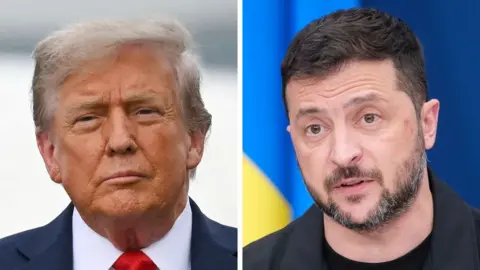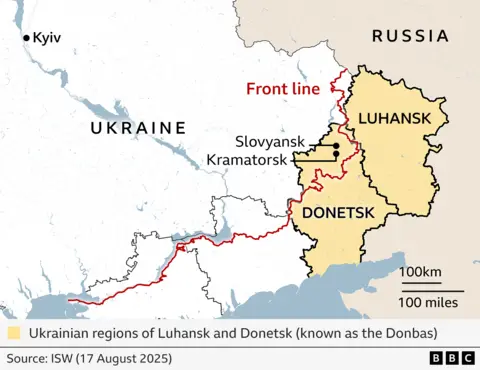
 AFP via Getty Images
AFP via Getty ImagesIt promises to be a day unlike any other at the White House later, when world leaders make a rare collective visit for crunch talks on Ukraine.
What had been billed as a meeting between two presidents, Donald Trump and Volodomyr Zelensky, has now become more of a summit.
Leaders from the UK, France, Germany, Italy, Finland, the EU and Nato have dashed across the Atlantic to have their say on how the three-year-old war with Russia should end and on what terms.
It's a reflection of how high the stakes are and increased European concerns that the US has shifted its position to one less favourable to Ukraine.
We break down what each of those present - and one who is not - would regard as a win when the sun sets on a long day of talks.
Trump's campaign promise was that he would solve this conflict on his first day in office but six months later the breakthrough he wants still eludes him.
The terms of any agreement have seemed less important to Trump than the deal itself, so the conditions have shifted over time.
Since meeting Russian President Vladimir Putin in Alaska on Friday, Trump appears to have ditched his criticism of Moscow and the threat of sanctions, and decided to pile the pressure on Zelensky instead.
In a late Sunday night social post, he warned the Ukrainian president he must forgo hopes of Nato membership and will have to concede Crimea, which Putin illegally annexed in 2014.
Trump's envoy Steve Witkoff said on Sunday that Washington would provide security guarantees to Europe aimed at deterring further Russian aggression. But the details remain unclear.
Up to now, the US has resisted European demands that it commits to the future security of Ukraine. All eyes will be on the White House later to see if that has really changed.
Zelensky finds himself in the unenviable position of having to stand his ground in the face of an increasingly impatient Donald Trump, who appears to have been swayed by Putin and who has already accused Zelensky of standing in the way of peace.
Trump will probably tell Zelensky he must agree to give up land. This will be extraordinarily difficult for the Ukrainian president to give in to as it would entail retreating from Donetsk and Luhansk, regions which thousands of Ukrainian soldiers have fought and died to protect since 2022.
It would also allow Russia to end up in control of huge swathes of territory it could later use as a launchpad for further aggression.
So Zelensky cannot agree to land concessions without strong security guarantees that would kick in should Russia attack again. Those could have been provided by Nato, but Trump has made it clear Ukraine will not join the alliance.
Details of any alternative guarantees have likely not been worked out yet, but without them it will be difficult for Zelensky to make any commitments.
Ukraine is also concerned by the fact that Trump seems to have moved on from wanting a ceasefire to pushing for a full peace deal. This could take an exceptionally long time, allowing in the meantime for continued Russian attacks, civilian deaths and frontline losses.

European leaders will be trying to push Trump to flesh out what US security guarantees for Ukraine could look like.
The vagueness of US statements on the matter is alarming to Europeans who feel protection from potential future attacks by Russia will have to come from a credible American commitment.
There is also nervousness around the idea that the US may insist Ukraine gives up land to Russia. The European continent has a long history of bloody wars and leaders want to avoid a scenario in which a sovereign country's borders are redrawn by force.
These serious concerns explain the unprecedented decision for such a large contingent of leaders to visit the White House at the last minute.
Last week, a virtual US-EU meeting ahead of the Alaska summit seemed to have the effect of hardening Trump's criticism of Russia; now that he is appearing to be teetering on Moscow's side again, European leaders will try to impress on him that their concerns about the continent's long-term security have not changed.
There will be no Russian representative at the White House today. That may not matter: it appears Putin made enough of an impression on Trump last week that Moscow may be confident its point of view will be adequately represented.
Trump has already stated Ukraine would not join Nato – and Russia wants that commitment reiterated and ratified. It also wants full control over the Donbas, which would entail Kyiv giving up the land it still holds in the Donetsk and Luhansk regions.
Perhaps most importantly Moscow has managed to instil in Trump that it is now up to Zelensky to make a deal to end the war – while knowing fully well he cannot agree to ceding territory outright. A win for Russia would be for this friction to lead to Trump walking away from the negotiating table for good and leaving Ukraine and the Europeans to fend for themselves.

28 PerFlyer

11 PerFlyer

12 PerFlyer

59 PerFlyer